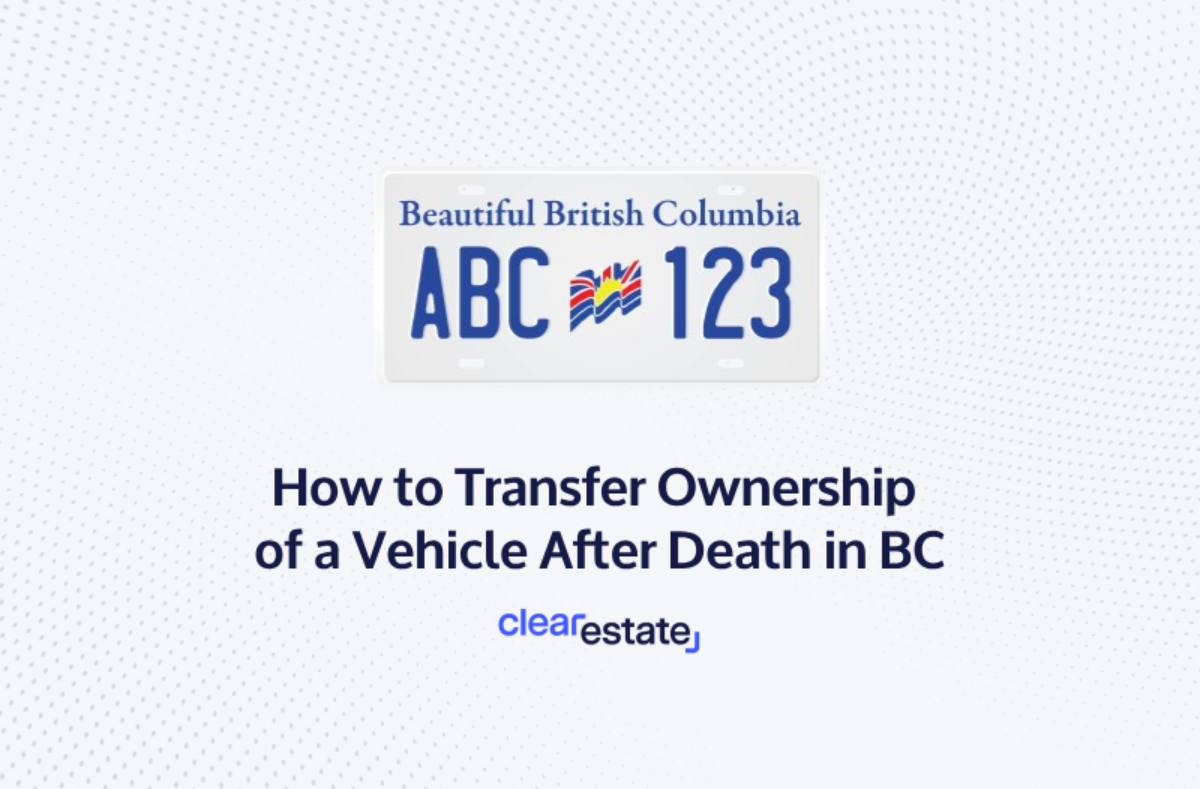Estate Settlement
Dec 04, 2024
How Do Executors Mail Inheritance Checks?
Find out how inheritance checks are mailed, including security measures and what to do if there are delays in receiving them.
Need to transfer an estate vehicle in BC? Our guide has you covered. follow our simple step-by-step guide to get it done:


As the executor of an estate, you shoulder the responsibility of transferring the deceased's property as they outlined in their will.
This fiduciary responsibility extends to the vehicles that the deceased owned.
In this article, we'll detail the steps required to transfer vehicle ownership after death of the owner in British Columbia - whether it's through a sale, or familial transfer, including the necessary ICBC documents.
Initiating the transfer of car ownership with the Insurance Corporation of British Columbia (ICBC) requires several key documents. While the exact documents needed may vary depending on the estate’s circumstances, the following are commonly required:
These documents are essential for a valid transfer process, ensuring that the vehicle ownership is legally passed on from the deceased to the rightful new owner. ICBC has prepared a checklist of required documents, which can be found here.
Before reaching out to ICBC, personal representatives should gather all relevant documents which will ensure a streamlined and smoother transfer and then contact an Autoplan Broker.
Similarly, personal representatives should ensure that the vehicle is not encumbered by any liens and that all insurance policies are up to date. Additionally, it’s important to check if there are any outstanding fines or tolls associated with the vehicle. Finally, it is important to cancel the deceased driver's license and notify ICBC of the death.
Transferring vehicle ownership after death in British Columbia is a multi-step process that involves several legal and administrative tasks. Here’s a comprehensive guide to the process:
ICBC provides a detailed checklist for estate transfers, summarizing the support documents and signatures required for various estate vehicle transactions. This checklist should be consulted to ensure compliance with all requirements.
For a smooth transition, it’s advisable to contact ICBC during non-peak hours and seek professional advice. Filling out documentation accurately and maintaining good record keeping is also a key to ensuring a smoother transfer.
Both the ICBC website and the Government of British Columbia website provide additional information for dealing with estates after death. ClearEstate has similarly provided some more detailed information on probate and intestate succession in BC, which help clarify the seemingly overwhelming processes.
As aforementioned, there may be instances where a vehicle is owned by more than one individual, generally a spouse. In British Columbia, when a vehicle is co-owned as joint tenancy, the right of survivorship allows the vehicle to automatically pass to the surviving owner(s) upon the death of one owner, bypassing the need for probate. In this case ICBC requires the surviving owner to provide a death certificate to authorize the transfer and the vehicle's registration.
As mentioned, a vehicle is considered as part of the deceased’s estate and property, meaning that a will should indicate the beneficiaries of the vehicle. In contrast, when there is no will the beneficiaries will be identified through intestate succession, which involves the distribution of assets according to provincial laws. These rules are set out in the Wills, Estates and Succession Act (WESA) and determine the hierarchy of beneficiaries, which typically includes the spouse and children first, followed by other relatives if there are no immediate family members. ICBC requires the Grant of Administration in order to legalize the transfer of vehicles after death.
Transferring the vehicle ownership of the deceased in British Columbia requires multiple forms and strict guidelines to follow - Whether through a will, survivorship rights, or intestate succession, it's essential for executors to ensure the process respects the deceased's wishes and adheres to legal standards.
Recognizing the complexity of these tasks, we offer our expertise to simplify the estate transfer process. Book a free consultation with us for tailored assistance in managing estate transfers in probate, ensuring a seamless and respectful ownership transition. Act now to fulfill your duties with confidence and ease.
 Simplify Probate Today
Simplify Probate Today
Get expert guidance from our probate specialists who've helped 10,000+ families.
Book a free consultation today